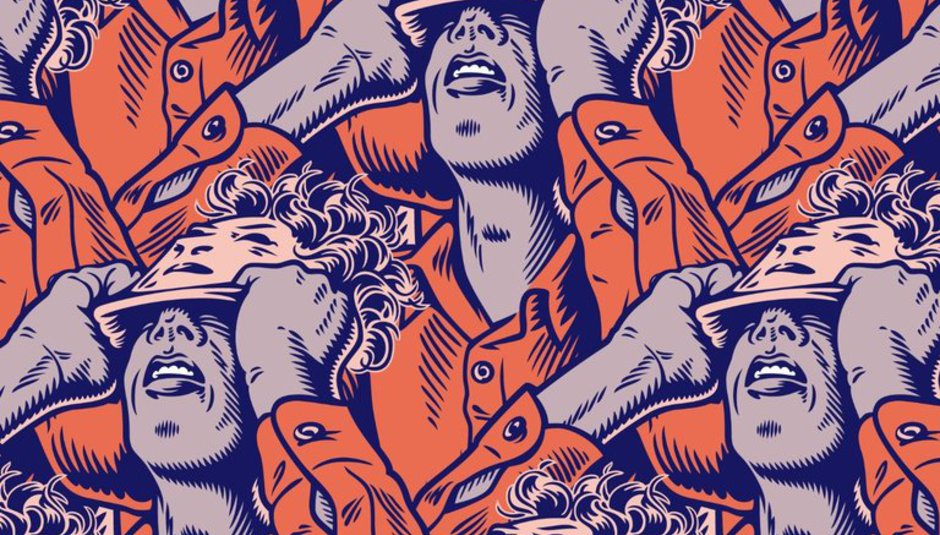Obviously, at this time of year in the world of dance music it's all about Croatian boat parties, Ibiza sunsets, Balearic beach raves and all-round sun-drenched bliss. So, entirely inappropriately, in this edition of armchair dancefloor you'll find me talking to some Germans about what winter is like in Berlin, waffling on about load of murky techno and warehouse-ready jungle, and repeatedly using the word 'icy' to describe synthesiser sounds. What can I say? I burn easily. Factor 50 at the ready...
Focus: Moderat
At a time like the present when stadium-sized, festival-ready dance music is such a dominant force on our cultural landscape, it feels like we need Moderat more than ever. In contrast to the self-consuming cycle of brainless sawtooth synth riffs thrown-up by the EDM circuit, the German band - a collaboration between Gernot Bronsert and Sebastian 'Charlie' Szary (aka Modeselektor) and Sascha Ring (aka Apparat) - is like a shining example of how to do direct, pop-infused electronic music right. Their second full-length album, ii was released this week, almost five years after their first LP. It's an album that walks a delicate line between the complex electronic timbres of each act's separate efforts and the joyous melodic drive of classic '80s pop hits, resulting in one of the year's most instantly likeable electronic albums.
Back at the start of July, I spoke to Gernot of Modeselektor (who also co-runs influential electronic labels 50 Weapons and Monkeytown with Szary) to find out more about the album's gestation and how things have changed for Moderat over the years between albums. We caught-up via a Skype connection to the band's Berlin studio, where they were busy putting finishing touches to their new live show, to talk about the benefits of time constraints, giving-up on the 'LED war' and why a good meal can be more of an influence than a promo CD...
How quickly after releasing the first Moderat LP did you guys decide you wanted to do another one?
"Actually, I don't know. The first record was kind of an experiment, so it wasn't really planned. When we finished the first Moderat record we wanted to go on tour for just three months, but we ended up touring for almost two and a half years. We didn't expect that sort of success at all.
"Since then a lot of things have changed, Charlie and me have different lives now; we have families, and the record label and shit like that. So we have a totally different rhythm of life. We needed to prepare the whole Moderat II thing pretty early in advance. So, we started talking about this maybe two years, or one and a half years ago. That's basically the difference compared to the first record."
"We really ran out of time. We don't have time, that's the only thing we don't have. We have too many things going on, so we needed to plan things in advance very, very early."
So how long did you guys actually spend in the studio recording the album itself?
"I think in total it was almost six months. We had two session, the first was three months and then we took six or seven weeks off, and then returned to the studio for another three months to finish the record. I think the first three months we spent suffering [laughs]. It's the typical thing. Then when we were on holiday, in the middle of the two blocks, we got more and more panicked. So once we got back in the studio we just got on with it and made some music."
That's quite a lot less time than you guys spent working on the first record, right?
"Oh yeah. The first one was more than a year, and it was really easy going. It was like, 'Yeah, let's hang, let's have a beer and just see what happens'. But this time we didn't have time. We were touring and in the studio at the same time, and with the label, all that stuff keeps us really busy. Sascha released an album, we released a movie, all at the same time.
"In the end we enjoyed all the pressure though, for some reason. When you have too much time, it's like those guys who start buying massive modular synths, you know? There are a lot of techno producers like that who were very productive back in their day, and then one day they start getting more and more into modular systems, and spend all their time looking for the right sounds. Looking for the perfect bass drum, or whatever. They totally forget about the music. We just decided we had six months to record this record, and no more, and that's actually the only way it's possible for us to make music these days."
When you all got back into the studio together, did you have a collective idea of what you wanted to do for this second album? Or did you each have separate ideas of where you wanted to go with the project?
"I think the main difference between the first record and this one is that we tried, last time, to bring two worlds together - the Modeselektor world and the Apparat world. This time we turned into a band. We didn't have any ideas about the music before, but we had the feeling of the sound. That was, maybe, the most important thing for us: that we really shared a common opinion about how this record was physically sounding.
"We had a lot of unfinished Modeselektor tracks and a lot of unfinished Apparat tracks, which we tried to reanimate; we call them dead bodies, we have hard drives full of them. That didn't turn out very well, then we ran out of time more and more... but then we just started writing songs."
What's the dynamic like in the studio these days - does it feel like Modeselektor and Apparat or are you just three people making music together? Is there a divide there at all?
"As I said, the first three months it was really complicated trying to find a language between us. It's not easy for Sascha; Charlie and me have known each other for 25 years, we went to primary school together, and we never make music alone, it's always been together. We're like an old couple, and Sascha's still the stranger in the studio. It took a while to find a language because - this is what most people don't know - Apparat's outside image is different to what he really is: he's a nerd, he's such a geek [laughs]. He inspired us a lot technically; we ended up changed a lot of the set-up.
"While we were working I was mostly the operator, or engineer, because I'm fast. We have two rooms in the studio, Studio A and Studio B, so if someone needs silence or wants to finish something alone, then he can go to the other room. But, you know, when you have the songs on a certain level of production, so they're almost done, you can't decide things alone anymore. So the later part of the production period we spent together sitting in front of a big screen... fighting over hi-hats and bass drums."
Do you think playing live so much after the first album was released influenced the way you wrote this record?
"No. But I'm really the one who wants to play live, so I always have it in mind. When we play live, I'm carrying the master machines, so for me it's always at the back of my mind. But I think if you produced music like that too much, it wouldn't be Moderat. When we make music with Modeselektor, we know which tracks will destroy a soundsystem, or whatever, but this time, for Moderat, we totally didn't want to think about stuff like that. When we were working, whenever I'd start talking about how we could play something live, the others would turn my volume down and say 'Shut up, let's make this track first then we'll think about that afterwards'.
"Right now we're back in the studio preparing the live show. That's really why we make this music together, because we love touring together; it's a lot of fun."
What's the idea behind your live show this time then? Are you working on a similar audio/visual set?
"We always work with Pfadfinderei - they make all the visuals for Modeselektor and all the artwork for the labels, they also did the visuals for the last Moderat tours. But when we started talking about this new live show, about a year ago, we said we didn't want to have any visuals. We got really fed up with this whole 'LED war' thing. It's like, every DJ now has a huge LED wall, and we don't want to be part of that. We started playing A/V live shows about 15 years ago, and we've got a bit tired of it. It was really hard decision for us, and for the Pfadfinderei visual artists, because they really didn't know what to do now. They've had a really hard job to make a show for us. It's ended up with us having a really great idea for a stage setup. Of course there is some visuals, but there's no LEDs...
"We were all really surprised, those guys were suffering for six months, looking for ideas and trying to work out what to do. But yeah, eventually it's all come together. The end result is very cinematic."
A fair amount of time has passed between the first and second Moderat albums and, naturally, the landscape of electronic music has changed quite a bit in that time, do you find that musical trends and things like that influence your writing process? Or are you more detached when you write music?
"That's an interesting question... I think... no. There's still a lot of good music and there's still a lot of shitty music, but there's been no big invention in the last few years. We really enjoy following our own sound. Of course, you always have influences, but the influences are different for us now. We're old now. A good meal influences us more than any music.
"There's so much music going on, obviously Charlie and me do the A&R for 50 Weapons and Monkeytown, so we get sent so many demos and so many promos everyday, so we really know what's going on, but it's not very often that there's something that touches our hearts. Moderat is not about making something super advanced, it's Charlie, Sascha and Gernot making some music.
"I think, with this record, the main influence was the winter. We had a really hard and strong winter; this winter was almost six months. And we have our studio in a very tall building in Berlin Mitte, where we're on the 15th floor. So we saw nothing but clouds for months, it was just grey and shit. I think that was the main influence, to make it warm inside our hearts..."
ii is out now via Monkeytown records.
---
The playlist: new and forthcoming releases
Addison Groove & Sam Binga - BS3 EP [50 Weapons]
Nominally, this collaborative EP from Bristol-affiliated producers Addison Groove and Sam Binga (best known under his former alias Baobinga) would probably be most succinctly categorised as a drum & bass release, although in reality there’s much more to it than that. Across the four tunes on offer here, the pair hit upon the sweet spot where the spirit of classic jungle meets both the rough-edged excitement of juke and the colourful, hyper-emotive sounds of vintage crossover garage. It all comes together in a pleasingly abstract way though; the pair succeed in touching on a lot of nostalgic influences whilst still sounding defiantly fresh and original. Highly recommended listening, even for those whose tastes don’t normally stray into the murky waters above 160bpm.
Black Sites - Prototype EP [PAN]
Black Sites is a new collaborative project between Hamburg-based producers Helena Hauff and F#X. This debut 12” for Berlin label PAN sees the pair turning in two dense and brilliantly fuzzy tunes that take classic Detroit-indebted synth lines and work them amongst an energetic patchwork of blown-out kick drums and distorted hats. Pleasingly lively stuff.
dBridge - Move Way [R&S]
Experimental drum & bass stalwart dBridge joins the roster of the revived R&S for this three-track EP. The title track itself, a joint venture with Skeptical, is pretty full-on stuff - based around a slightly tongue-in-cheek, statement-making Jamaican vocal sample and a relentless rhythm of pounding half-time bass drums. The b-side cuts are a little deeper, however; “Death Of A Drum Machine” lays a gorgeous backdrop of disjointed, rattling piano chords under a classic drum & bass rhythm, whilst “Plain To See” drops the pace for a richly textured production of sci-fi soundtrack synths.
Disco Nihilist - Journey To The End Of The Night [DBA Special Editions]
US-producer Mike Taylor (aka Disco Nihilist) has a remarkable talent for turning out brilliantly rough-and-ready house and techno jams. His tunes sound as if they’ve been produced on the cheap and in a hurried frenzy of excitement, yet are consistently drenched in raw energy and are built around genuinely infectious, funk-infused grooves. This latest four-track EP for London imprint Don’t Be Afraid is no exception. It’s a work of dance music classicism that avoids getting too bogged-down in nostalgia; Taylor is obviously more concerned with capturing the immediacy of classic house than painstakingly replicating the sounds of ‘80s hardware. It’s classic underground house music at its best.
Greg Beato - PMA [L.I.E.S]
L.I.E.S - the experimental Brooklyn-based label run by Ron Morelli - is enjoying an exceptionally strong year, having already issued a run of essential releases from the likes of Delroy Edwards, Marcos Cabral, Terekke and Florian Kupfer. This three-track 12” from Miami-based newcomer Greg Beato is the latest dispatch from the prolific imprint. It features three tracks of wonderfully skewed yet surprisingly catchy house, full of weird percussive timbres and runaway synth lines. Beato is also the second DJ to turn in a mix for the new L.I.E.S podcast series.
Special Request - Hardcore EP [Houndstooth]
Paul Woolford - Untitled [Hotflush]
Paul Woolford seems to be on real form this summer. His latest release under his unashamedly retro-leaning Special Request alias, his first for Fabric offshoot Houndstooth, is a perfectly executed piece of jungle-infused rave nostalgia. The EP blends floor-shaking techno rhythms with playfully-deployed pirate radio sounds to create - with the help of stellar remixes from Anthony Naples and Lee Gamble - possibly the most accomplished Special Request outing to-date. "Untitled", meanwhile, is arguably the biggest house tune of the summer. With its rattling percussion, delayed piano line and relentlessly catchy vocal hook, it's vintage floorfilling stuff. Woolford throws it all together with pure skill though, resulting in a big room, hands-in-the-air type of house tune that sacrifices none of the nuances or subtleties of Woolford's deeper works.
Stoop - Opacity EP [YZA]
This four track debut EP from newcomer Stoop - available as a free-download via London-based label YRZ - blends the icier, more-skeletal ends of hip-hop beatmaking with elements of drone and atmospheric synth music. Opener “Enter The Rabbit Hole” is probably the highlight here; its combination of droning subs, rattling, ominous percussion outbursts and oddly-timed atmospherics are brilliantly otherworldly, creating vivid sense of menacing isolation. There's enough unexpected gear-shifts and clever sound design tricks to make the whole thing worthy of repeat listens though.
Various - We Didn’t Think We’d Make It This Far Vol.1 [Donky Pitch]
Across the course of three years and ten releases, Brighton label Donky Pitch has done an impressive job of establishing a well-defined and fairly unique sonic identity. The imprint’s releases - which have come from artists like Slugabed, Ghost Mutt, 813 and Keyboard Kid 206 - tend to exist in the space orbiting trap and dubstep, but avoid getting caught-up the bravado-driven, drop-obsessed pitfalls of either genre by invariably being far more colourful, eccentric and sonically creative. To celebrate the ten-release milestone, the label has made this 18-track label sampler available as a free download. The comp includes cuts from each Donky Pitch release, alongside a host of exclusives from the label’s roster of artists. In all there’s plenty of excellent music to get your teeth into. Grab it from Bandcamp here.
Various - 100DSR/VAR2 [Delsin]
Another label comp in the works, this time from Amsterdam-based techno imprint Delsin. To celebrate hitting catalogue number 100, the label is releasing five multi-artist 12”s, which will eventually be compiled on CD later in the year. The first release, which arrived in June, featured excellent cuts from Claro Intelecto, Gerry Read and Unbroken Dub. This second EP continues the run in equally strong form, featuring three new tunes: CiM’s first release in nine years, a brilliant piece of murky techno from Conforce and an all-out dancefloor assault courtesy of Mike Dehnert.
For occasional links to new music, mixed with a lot of inane nonsense, you can follow Si on Twitter.






















